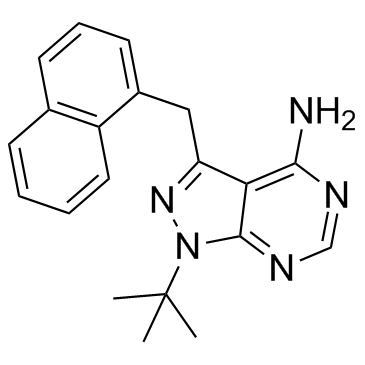221244-14-0
| Name | 1-nm-pp1 |
|---|---|
| Synonyms |
1-(2-Methyl-2-propanyl)-3-(1-naphthylmethyl)-1H-pyrazolo[3,4-d]pyrimidin-4-amine
1-NM-PP1 1-tert-butyl-3-(naphthalen-1-ylmethyl)-1H-pyrazolo[3,4-d]pyrimidin-4-amine 1-(1,1-dimethylethyl)-3-(1-naphthalenylmethyl)-1H-pyrazolo[3,4-d]pyrimidin-4-amine 1H-Pyrazolo[3,4-d]pyrimidin-4-amine, 1-(1,1-dimethylethyl)-3-(1-naphthalenylmethyl)- 1-tert-butyl-3-(naphthalen-1-ylmethyl)pyrazolo[3,4-d]pyrimidin-4-amine 4-Amino-1-tert-butyl-3-(1'-naphthylmethyl)pyrazolo[3,4-d]pyrimidine Mutant Kinases Inhibitor II PP1 Analog II,1NM-PP1 1-NMPP1 |
| Description | 1-NM-PP1 is a cell permeable protein kinase D (PKD) inhibitor with an IC50 of 0.398 μM. |
|---|---|
| Related Catalog | |
| Target |
Cdk7as/as:50 nM (IC50) |
| In Vitro | Cdk7 from Cdk7as/as or Cdk7+/+ cells is immunoprecipitated and tested its kinase activity towards both a Pol II CTD-containing fusion protein (GST-CTD) and human Cdk2. Cdk7 recovered from the mutant, but not the wild-type, cells is inhibited by 1-NM-PP1 (1-NMPP1), with an IC50 of ~50 nM with either substrate. Replacement of wild-type Cdk7 with Cdk7as/as also rendered growth of HCT116 cells sensitive to 1-NM-PP1. In the absence of 1-NM-PP1, the wild-type andCdk7as/as cells had population doubling times of ~17.9 and ~20.2 h, respectively, with similar cell-cycle distributions in asynchronous culture, indicating minimal impairment of Cdk7 function by the F91G mutation per se. The homozygous Cdk7as/as cells are sensitive to 1-NM-PP1, however, with an IC50 ~100 nM measured by cell viability (MTT) assays performed after 96 h of 1-NM-PP1 exposure. In contrast, wild-type HCT116 cells are resistant to 10 μM 1-NM-PP1. Addition of 10 μM 1-NM-PP1 retards G1/S progression by the mutant but not the wild-type cells. When added simultaneously with serum to the Cdk7as/as cells, 1-NM-PP1 prevents any progression into S phase in the next 15 h. After 24 h, there is evidence of progression into S-phase by a fraction of Cdk7as/as cells released from serum starvation directly into medium containing 1-NM-PP1, while a fraction remained in G1. The addition of 1-NM-PP1 3 h or 6 h after serum addition delays S-phase entry by ~7 h or by ~3 h, respectively[1]. |
| Kinase Assay | Immunoblotting and immunoprecipitation, and kinase assays of immune complexes, are carried out. To measure Cdk1/cyclin B assembly, extracts (200 μg total protein) from cells in mitosis or G2 are pre-incubated with 2 μM 1-NM-PP1 or DMSO, then added 500 ng purified cyclin B1, amino-terminally tagged with hexahistidine and the Myc epitope, and an ATP-regenerating system. Where indicated, incubations are supplemented with 400 ng purified Csk1 or 600 ng wild-type or analog-sensitive, T-loop-phosphorylated Cdk7/cyclin H/Mat1 complex. After 90 min at room temperature, Myc-cyclin B and associated proteins are immunoprecipitated with anti-Myc antibodies and immune complexes are subjected to immunoblotting, with anti-Myc and anti-Cdk1 antibodies, and tested for histone H1 kinase activity[1]. |
| Cell Assay | Wild-type or Cdk7as/as HCT116 cells are synchronized by incubation in serum-free medium for 48 h and released into medium containing 10% fetal calf serum. Synchronization with thymidine or nocodazole, and analysis of cell-cycle distribution by flow cytometry, are performed. Cell viability is measured by MTT assay[1]. |
| References |
| Density | 1.3±0.1 g/cm3 |
|---|---|
| Boiling Point | 545.7±45.0 °C at 760 mmHg |
| Melting Point | 175-176ºC |
| Molecular Formula | C20H21N5 |
| Molecular Weight | 331.414 |
| Flash Point | 283.8±28.7 °C |
| Exact Mass | 331.179688 |
| PSA | 69.62000 |
| LogP | 3.96 |
| Vapour Pressure | 0.0±1.5 mmHg at 25°C |
| Index of Refraction | 1.675 |
| Storage condition | 2-8℃ |
